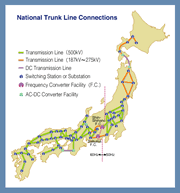National Energy Grid
|
 |
|
Full Size Map National Electricity Transmission Grid of Japan(14 kb) |
GRID SUMMARY
Japan lacks significant domestic sources of energy
and must import substantial amounts of crude oil,
natural gas, and other energy resources, including
uranium for its nuclear power plants. In 1999, the
country's dependence on imports for primary energy
stood at more than 79%. Oil provided Japan with 52%
of its total energy needs, coal 15%, nuclear power
15%, natural gas 13%, hydroelectric power 4%, and
renewable sources 1.3%. About half of Japan's energy
is used by industry and about one-fourth by transportation,
with nearly all the rest used by the residential,
agricultural, and service sectors. Japan's energy
intensity (energy use per unit of GDP) is among the
lowest in the developed world.
Japan generated 1,018 billion kilowatthours (Bkwh) of electricity on 226 gigawatts of capacity in 1999. Of Japan's total generation in 1999, about 59% came from thermal (oil, gas, and coal) plants, 30% from nuclear reactors, 8% from hydroelectric dams, and less than 3% from geothermal, solar, and wind. Due to the country's desire to enhance its energy security, Japan has developed a large nuclear power industry. Despite its relatively high cost, natural gas, mainly imported as LNG, also is likely to experience considerable growth as a fuel for electricity generation. Renewables, chiefly hydropower and geothermal energy, also are expected to grow, and both coal and nuclear are projected to grow in absolute terms (although nuclear power's share of the market is expected to drop). An accelerating decline is projected for oil-fired generation, which is still more significant in Japan than in most other developed countries. In the short-term, Japan's economic slowdown had resulted in a sharp downturn in capital spending by utilities, which has delayed several new power plant projects.
Japan's electricity prices are by far the highest in the OECD, and Japan has begun a program of reforms designed to make its electric utility sector more efficient. Currently, Japan is served by 10 vertically integrated utilities which each have a specific geographic zone. The Japanese Diet passed a bill in May 1999 which amended the Electric Utilities Industry Law (EUIL) to allow a partial opening to competition. Beginning in March 2000, about 8,000 large industrial and commercial Japanese electric power consumers, comprising roughly one-third of the Japanese power market, have been able to chose their electricity suppliers. Regional utilities currently are obligated to allow power from other suppliers to transit their grids to these large consumers.
While a small percentage of Japan's electricity has been provided by independent power producers (IPPs) since 1995, the new deregulation is expected to generate much more investor interest in developing IPPs, though progress in this direction has been slower than expected due to weak demand.
ENERGY SUMMARY : JAPAN
Map
of Japanese Electricity Grid | National Energy Grid Index
GENI Home Page | Contact
GENI | Subscribe
to GENI Newsletter | Pledge
| Comments
| GENI Forum
Email this page to a friend
If you speak another language fluently and you liked this page, make
a contribution by translating
it! For additional translations check out FreeTranslation.com
(Voor vertaling van Engels tot Nederlands)
(For oversettelse fra Engelsk til Norsk)
(Для дополнительных
переводов проверяют
FreeTranslation.com )

